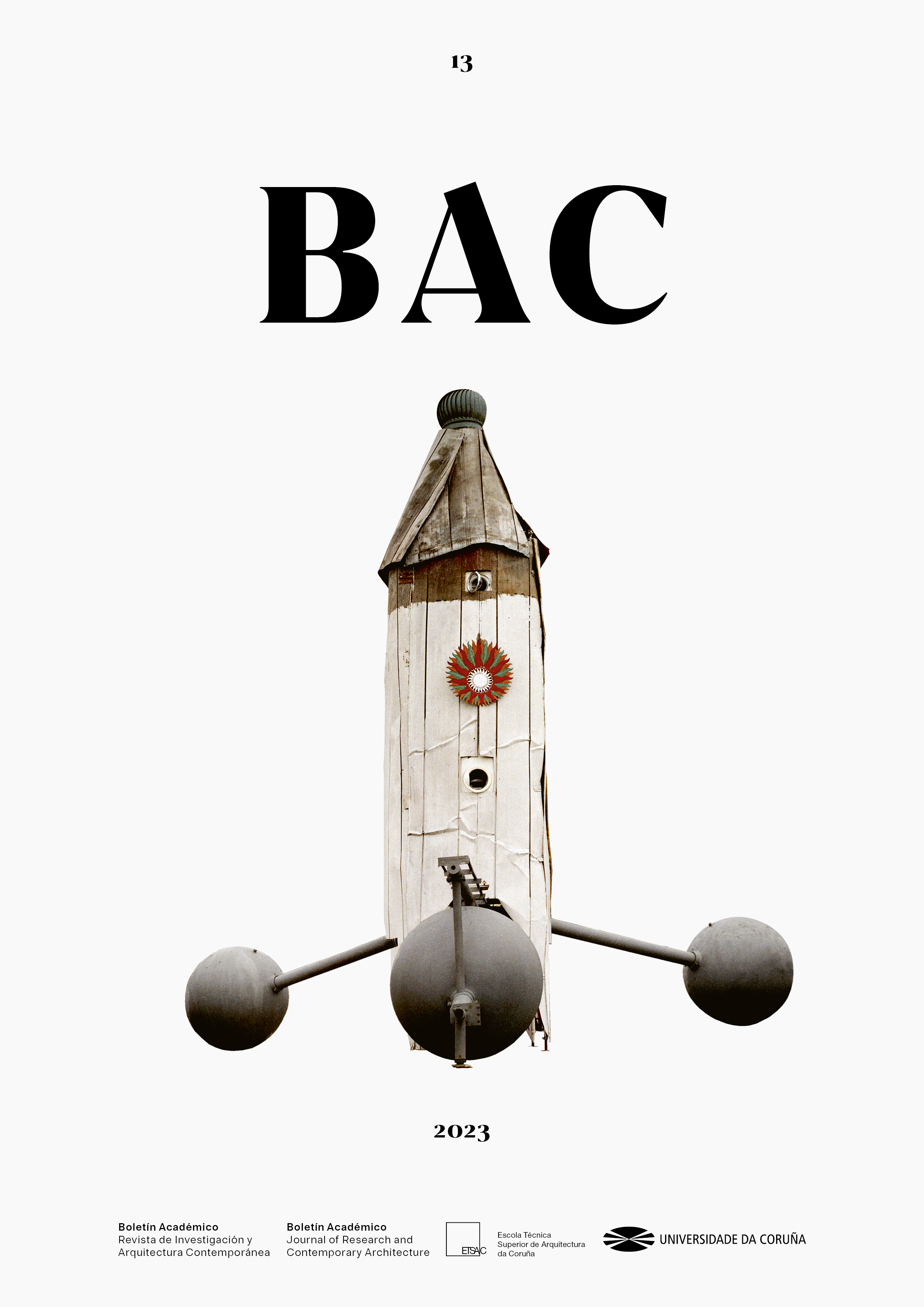De Voom Voom a The Chemical Brothers:
intensificación de la experiencia arquitectónica en ambientes lúdico-festivos
DOI:
https://doi.org/10.17979/bac.2023.13.0.9470Palabras clave:
efectos, ambientes, espectador, atmósfera, experienciaResumen
En pleno auge del arte psicodélico de las décadas de los 60 y los 70, una serie de puestas en escena resultaron relevantes por su capacidad de generar nuevos espacios no lineales en los que el espectador se convertiría en “constructor temporal de la experiencia y dueño de su propio disfrute”. Así, se estudiará un conjunto de proyectos en los que coexistían los espacios interactivos con todo tipo de estructuras hinchables; todo ello acompañado de músicas y melodías que posibilitarían la inmersión del espectador en una suerte de ‘viaje’ alucinatorio, similar al de las experiencias psicotrópicas.
Lo que se pretendía con estos dispositivos de carácter lúdico-festivo no era tanto reconfortar al espectador en su propia comodidad, sino mostrarse como un nuevo campo para los juegos ambientales, la experimentación en todos sus sentidos y la exploración de una nueva e inesperada realidad perceptiva a través de la superposición de múltiples estímulos.
Descargas
Referencias
Barker, Christopher. “Behind the scenes of a Chemical Brothers live show”. Entrevista con Smith y Lyall. Acceso el 30 de julio de 2019. https://www.semipermanent.com/stories/chemical-brothers-live.
Borch, Christian, ed. Architectural Atmospheres. On the experience and politics of architecture. Basilea: Birkhäuser, 2014.
Brooks, Michael. “Architecture of concert stage designs”. Acceso el 30 de noviembre de 2019. https://www.designingbuildings.co.uk/wiki/Architecture_of_concert_stage_designs.
Brugellis, Pino, Gianni Pettena y Alberto Salvadori. Radical utopias. Macerata: Quodlibet, 2017.
Collado Arpia, Manuel. “De la psicodelia a las cortinas del siglo XXI”. Tesis doctoral. Universidad Politécnica de Madrid, 2012. https://doi.org/10.20868/UPM.thesis.22606
Cunningham, Mark. “Pink Floyd. The Wall”. Acceso el 25 de abril de 2020. https://issuu.com/markcunningham2/docs/pink_floyd_the_wall.
Deleuze, Gilles y Félix Guattari. Mil Mesetas. Capitalismo y esquizofrenia. Valencia: Pre-Textos, 2004.
Goodman, Steve. Sonic Warfare. Sound, Affect, and the Ecology of Fear. Cambridge: The MIT Press, 2010.
Hunt, George P., ed. “Psychedelic Art”. LIFE (septiembre 1966).
Mantzou, Polyxeni. “Arquitectura animada”. Oeste: Revista de arquitectura y urbanismo del Colegio oficial de arquitectos de Extremadura 17 (2004).
Marchán Fiz, Simón. Del arte objetual al arte de concepto. Epílogo sobre la sensibilidad “postmoderna”. Madrid: Akal, 1986.
Navarro Jover, Luis. “La dimensión imposible: estrategias de alteración de la percepción y las ideas en el arte y la arquitectura desde la segunda mitad del siglo XX”. Tesis doctoral. Universidad Politécnica de Madrid, 2021. https://doi.org/10.20868/UPM.thesis.69512
Paci Dalò, Roberto y Emanuele Quinz, eds. Mil sonidos. Deleuze, Guattari y la música electrónica. Barcelona: Tercero Incluido, 2022.
Parga Prado, Marcos. “Experimentación radical italiana en torno al night-club Warhol-McLuhan-Price y la arquitectura eléctrica de los años 60”. RITA: Revista Indexada de Textos Académicos 3 (2015). https://doi.org/10.24192/2386-7027(2015)(v3)(07)
Parga Prado, Marcos. “La opción radical: viajes a través de Superstudio”. Tesis doctoral. Universidad Politécnica de Madrid, 2015. https://doi.org/10.20868/UPM.thesis.40190
Perry, Charles. The Haight-Ashbury: A history. Nueva York: Random House, 1984.
Quiroga Fernández, Sofía. “Luz industrial e imagen tecnificada. De Moholy Nagy al C.A.V.S”. Tesis doctoral. Universidad Politécnica de Madrid, 2015. https://doi.org/10.20868/UPM.thesis.40108
Restany, Pierre. “Breve storia dello stile Yéyé”. Domus 446 (1967).
Rodríguez Cedillo, Carmelo. “Arqueología del futuro”. Tesis doctoral. Universidad Politécnica de Madrid, 2016. https://doi.org/10.20868/UPM.thesis.40365
Sloterdijk, Peter. “Architektur als Immersionskunst”. Arch+ 178 (2006).
Wigley, Mark. “The architecture of atmosphere”. Daidalos 68 (1998).

